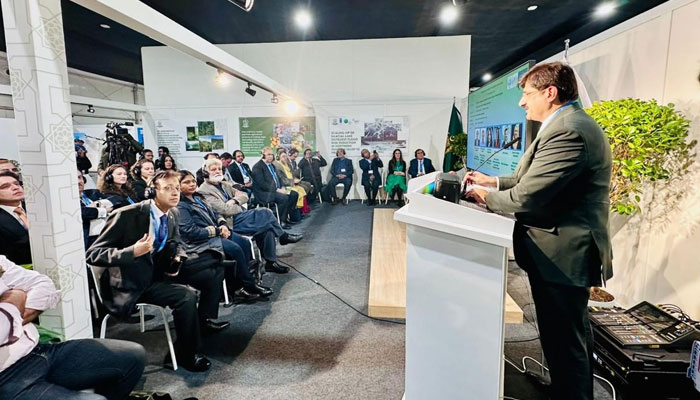Murad unveils Sindh Delta Blue Carbon Project at COP-29
CM details his government’s concerted efforts to restore these ecosystems since 1980s
BAKU: Sindh Chief Minister Syed Murad Ali Shah, has emphasised the transformative Delta Blue Carbon (DBC) project in the Indus Delta, Sindh.
“We have [Sindh] a 230-kilometre coastline and its 667,000 hectares of wetland ecosystems in mitigating and adapting to climate change,” he said while speaking at COP-29 on Nature’s Carbon Solution here.
Murad addressed the degradation of mangrove forests caused by past policy failures, deforestation, and reduced freshwater inflow and detailed the Sindh government’s ongoing efforts to restore these ecosystems since the 1980s.
He was the keynote speaker, presenting the transformative Delta Blue Carbon (DBC) project in the Indus Delta, Sindh.
He emphasised the critical role of Sindh’s 230-kilometer coastline and 667,000 hectares of wetland ecosystems in climate change mitigation and adaptation.
Discussing the degradation of mangrove forests due to the past policy failures, deforestation, and reduced freshwater inflow, the chief minister detailed his government’s concerted efforts to restore these ecosystems since the 1980s.
The DBC Phase-1 Project, initiated in 2013 and implemented in 2015, emerged as a pioneering public-private partnership between the Sindh Forest and Wildlife Department and Indus Delta Capital (IDC) Limited.
The project has become a beacon for blue carbon conservation and restoration, receiving global recognition with Triple Gold Level Validation for its climate change adaptation, biodiversity conservation, and community development benefits.
Murad Shah celebrated the project’s achievements in enhancing Pakistan’s resilience to climate change, improving coastal ecosystems, and fostering sustainable livelihoods.
He called for international recognition of such projects and stressed the importance of transparent consultation with project proponents in utilising carbon credits under national commitments.
During a dynamic panel discussion, Ms. Mandy Rambharos, CEO of VERRA, lauded the DBC project for its groundbreaking work in restoring mangroves and creating sustainable livelihoods in the Indus Delta.
She emphasised the role of public-private partnerships and innovative technologies in addressing climate challenges, calling the project a model for effective climate action.
The event further highlighted the need to incentivise local communities through initiatives like Mangrove Stewardship Agreements, ensuring sustainable restoration and conservation of blue carbon habitats.
The event concluded with group discussions, where the chief minister underscored Sindh’s leadership in climate adaptation and mitigation.
The Delta Blue Carbon Project was hailed as a global example of nature-based solutions and digital innovation in tackling climate change.
This showcase at COP-29 demonstrated Pakistan’s commitment to addressing climate change and the potential of collaborative efforts in securing a sustainable future for coastal ecosystems and local communities.
-
 Bridgerton’s Michelle Mao On Facing Backlash As Season Four Antagonist
Bridgerton’s Michelle Mao On Facing Backlash As Season Four Antagonist -
 King Charles Gets New ‘secret Weapon’ After Andrew Messes Up
King Charles Gets New ‘secret Weapon’ After Andrew Messes Up -
 Shia LaBeouf Makes Bold Claim About Homosexuals In First Interview After Mardi Gras Arrest
Shia LaBeouf Makes Bold Claim About Homosexuals In First Interview After Mardi Gras Arrest -
 Princess Beatrice, Eugenie ‘strained’ As They Are ‘not Turning Back’ On Andrew
Princess Beatrice, Eugenie ‘strained’ As They Are ‘not Turning Back’ On Andrew -
 Benny Blanco Addresses ‘dirty Feet’ Backlash After Podcast Moment Sparks Online Frenzy
Benny Blanco Addresses ‘dirty Feet’ Backlash After Podcast Moment Sparks Online Frenzy -
 Sarah Ferguson Unusual Trait That Confused Royal Expert
Sarah Ferguson Unusual Trait That Confused Royal Expert -
 Prince William, Kate Middleton Left Sarah Ferguson Feeling 'worthless'
Prince William, Kate Middleton Left Sarah Ferguson Feeling 'worthless' -
 Ben Affleck Focused On 'real Prize,' Stability After Jennifer Garner Speaks About Co Parenting Mechanics
Ben Affleck Focused On 'real Prize,' Stability After Jennifer Garner Speaks About Co Parenting Mechanics -
 Luke Grimes Reveals Hilarious Reason His Baby Can't Stop Laughing At Him
Luke Grimes Reveals Hilarious Reason His Baby Can't Stop Laughing At Him -
 Why Kate Middleton, Prince William Opt For ‘show Stopping Style’
Why Kate Middleton, Prince William Opt For ‘show Stopping Style’ -
 Here's Why Leonardo DiCaprio Will Not Attend This Year's 'Actors Award' Despite Major Nomination
Here's Why Leonardo DiCaprio Will Not Attend This Year's 'Actors Award' Despite Major Nomination -
 Ethan Hawke Reflects On Hollywood Success As Fifth Oscar Nomination Arrives
Ethan Hawke Reflects On Hollywood Success As Fifth Oscar Nomination Arrives -
 Tom Cruise Feeling Down In The Dumps Post A Series Of Failed Romances: Report
Tom Cruise Feeling Down In The Dumps Post A Series Of Failed Romances: Report -
 'The Pitt' Producer Reveals Why He Was Nervous For The New Ep Of Season Two
'The Pitt' Producer Reveals Why He Was Nervous For The New Ep Of Season Two -
 Maggie Gyllenhaal Gets Honest About Being Jealous Of Jake Gyllenhaal
Maggie Gyllenhaal Gets Honest About Being Jealous Of Jake Gyllenhaal -
 'Bridgerton' Star Luke Thompson Gets Honest About Season Five
'Bridgerton' Star Luke Thompson Gets Honest About Season Five




